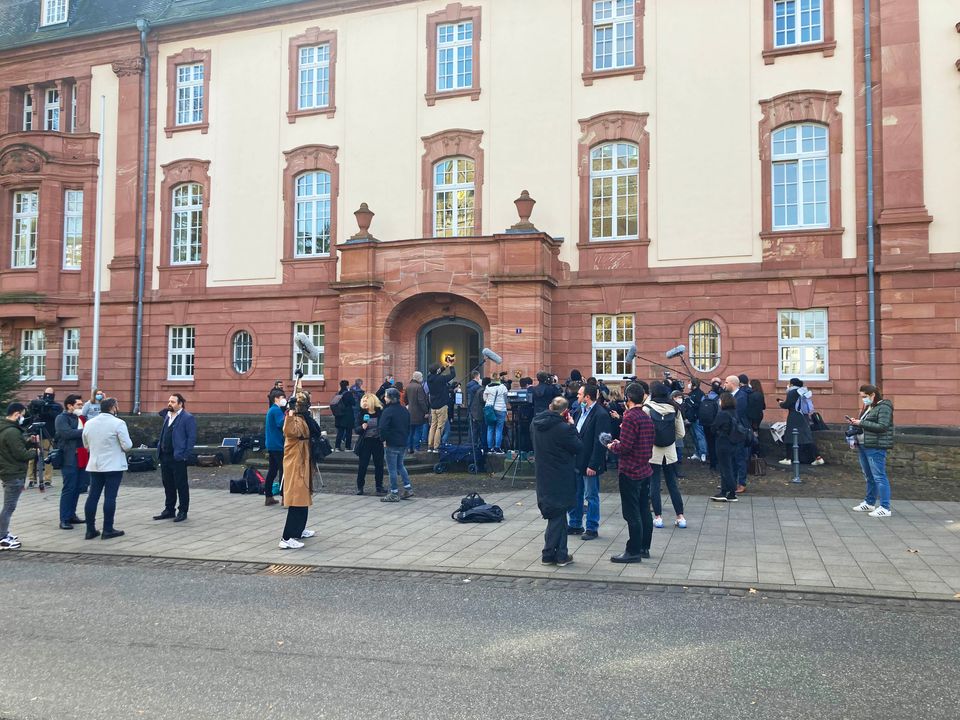
Germany and the Netherlands Must Improve Psychosocial Support for Survivors in Criminal Trials
The Koblenz Trial – the first major trial against a Syrian government affiliate – took place in Germany from 2020 until 2022. Throughout the proceedings, witnesses and survivors talked in detail about sensitive topics, including their experiences being tortured and subjected to other forms of violence. This adversely impacts the mental health of participants and observers alike. Despite the high risk of re-traumatization, SJAC’s trial monitors who observed each day of the proceedings consistently noticed that witnesses and survivors seemed to lack awareness of and access to psychosocial support services available to them.
Yet access to psychosocial support services (PSS) in connection to criminal proceedings is particularly relevant to Syrians living in German or the Netherlands. Germany has the largest Syrian refugee population in Europe and is on the forefront regarding universal jurisdiction prosecutions of crimes committed in the Syrian conflict. The Netherlands is also conducting these prosecutions and is actively reaching out to survivors and witnesses. When working with survivors and witnesses, both countries – as members of the European Union – are bound by relevant regional legal frameworks, such as the European Union’s (EU) Directive on Victim Rights. Both countries, however, have some margin of appreciation in implementing these frameworks and bringing them to life.
As such, SJAC has published a factsheet for Syrian survivors of atrocity crimes to guide them through the psychosocial support services available in Germany and the Netherlands. During this process, SJAC analyzed the psychosocial support structures in both countries and identified their shortcomings, the solutions to which are outlined below.
Government-provided services
Acquiring government-provided psychosocial support can be daunting in Germany, and the administration of services varies from state to state. In contrast, the process in the Netherlands is much clearer, making government-provided psychosocial support more readily accessible. This distinction reflects the transparency of the German and Dutch legal systems. In Germany, accessing information about legal proceedings is difficult due to generally insufficient outreach and the subsequent bureaucracy. Consequently, when witnesses and survivors struggle to access basic information on proceedings, the likelihood of them knowing what PSS resources are available to them is reduced. On the other hand, the Netherlands offers more unbureaucratic ways to obtain information, including through personal interactions with authorities at victim information points, as well as private online portals for survivors. Both avenues build trust between individuals and the authorities, and they encourage information dissemination. Moreover, victim-centered regulations impacting Dutch courts further increase survivors’ comfort, create a feeling of control over the situation, and reduce their stress.
Non-Governmental Service Providers
Non-governmental psychosocial support providers also play a crucial role in both countries. They are especially effective at providing information about victims’ rights and explaining criminal proceedings. Furthermore, they offer more practical advice and support when filing applications and navigating bureaucracy. Non-governmental psychosocial services also contribute to a normalization of psychological effects of crimes, which reduces stress and motivates people to seek support. Thus, non-governmental organizations are important, not only to offer services, but to inform communities of survivors about the services available to them.
Common Hurdles
Several hurdles for accessing psychosocial support are consistent across governmental and non-governmental providers in both countries. First, services are limited in rural areas, forcing individuals to commute to larger cities where they can receive the specialized care they need. But this process costs time and money that many survivors do not have. Second, access to Arabic services that are culturally sensitive and specialized in conflict-related trauma is limited. While these providers exist, they are few and far between, which means that they have waitlists for their patients with complex and immediate needs. Further, online databases and search functions mainly operate in the language of the relevant country. While the websites can be translated, the results often exclude foreign-language services, including those offered in Arabic.
Recommendations
Based on observations of criminal proceedings, direct work with survivors, and the structural analysis of existing psychosocial support services in Germany and the Netherlands, SJAC has compiled the following recommendations to ensure that future proceedings concerning crimes committed in Syria are in the best interest of justice:
- PSS providers should prioritize information dissemination in order to inform Syrians of opportunities to receive PSS. Resources should be available in Arabic to increase accessibility, and online databases should allow for multilingual searching. Interactive online tools, tutorials, or podcasts present a valuable resource for survivors to obtain immediate support before they can access more professionalized, direct support.
- PSS services should be expanded to be available to individuals residing in both urban and rural areas.
- Asylum-seekers participating in legal proceedings should be entitled to government-provided PSS, regardless of their resident status.
- Government providers should ease the bureaucratic hurdles that restrict access to PSS. They should streamline application processes which should be offered in Arabic. Additionally, services should be covered by public health insurance and, for asylum seekers, the services should be cost reimbursable.
- Authorities involved in legal proceedings should receive trauma-informed and culturally-sensitive training based on best practices for interacting with witnesses and survivors of atrocity crimes.
- Courts should consider the special relationship between individuals participating in legal proceedings and their PSS providers, including trial support PSS providers, such that confidential communication is privileged at trial.
While these recommendations require time and resources, they result in legal proceedings in which witnesses and survivors are active participants with agency over their mental health when resurfacing traumatic memories. Only when people are mentally prepared and feel comfortable sharing their stories can their testimony be fairly used in accountability processes that are crucial for long-term justice.
_________________________
For more information or to provide feedback, please contact SJAC at [email protected] and follow us on Facebook and Twitter. Subscribe to SJAC’s newsletter for updates on our work.